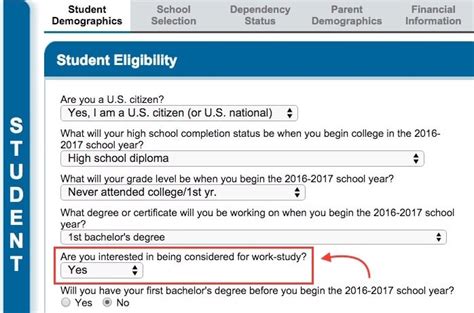Work-study is a federally funded program that provides part-time employment to students with financial need. The program helps students offset the cost of their education by allowing them to earn money while they attend school.

Who is Eligible for Work-Study?
To be eligible for work-study, you must:
- Be a U.S. citizen or permanent resident
- Be enrolled at least half-time in a degree-granting program
- Demonstrate financial need
How to Apply for Work-Study
To apply for work-study, you must complete the Free Application for Federal Student Aid (FAFSA). On the FAFSA, you will be asked if you want to be considered for work-study. If you answer yes, you will be asked to provide additional information, such as your work history and your financial need.
After You Apply
Once you have submitted the FAFSA, your financial aid office will review your information and determine if you are eligible for work-study. If you are eligible, you will be sent a work-study award letter. The award letter will tell you how much money you have been awarded and how many hours you are allowed to work per week.
Finding a Work-Study Job
Once you have received your work-study award, you can start looking for a job. Work-study jobs are available on campus and off campus.
To find a work-study job on campus, you can:
- Visit the career services office
- Check the job postings on the school website
- Talk to your professors and advisors
To find a work-study job off campus, you can:
- Search for job openings online
- Contact local businesses and organizations
- Attend job fairs
Benefits of Work-Study
There are many benefits to participating in the work-study program. These benefits include:
- Earning money to help pay for college expenses
- Gaining valuable work experience
- Developing new skills
- Networking with potential employers
Conclusion
If you are a student with financial need, work-study is a great way to help pay for college. The program provides you with the opportunity to earn money while you attend school and gain valuable work experience.
Frequently Asked Questions
1. How much money can I earn through the work-study program?
The amount of money you can earn through the work-study program depends on your financial need and the number of hours you are allowed to work per week. The average work-study student earns between $2,000 and $3,000 per year.
2. What types of jobs are available through the work-study program?
There are a variety of work-study jobs available on campus and off campus. Some common work-study jobs include:
- Clerical work
- Tutoring
- Research assistantships
- Library work
- Food service
3. How do I apply for a work-study job?
To apply for a work-study job, you can:
- Visit the career services office
- Check the job postings on the school website
- Talk to your professors and advisors
- Search for job openings online
- Contact local businesses and organizations
- Attend job fairs
4. What are the benefits of participating in the work-study program?
There are many benefits to participating in the work-study program, including:
- Earning money to help pay for college expenses
- Gaining valuable work experience
- Developing new skills
- Networking with potential employers
5. How can I find a work-study job that is a good fit for me?
There are a few things you can do to find a work-study job that is a good fit for you. First, consider your interests and skills. Second, research the different types of work-study jobs that are available. Finally, network with potential employers.
6. What should I do if I have any questions about the work-study program?
If you have any questions about the work-study program, you should contact your financial aid office.
